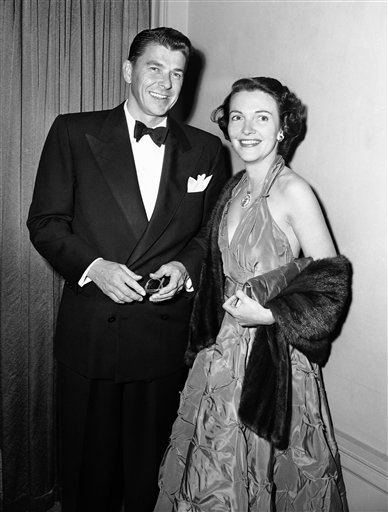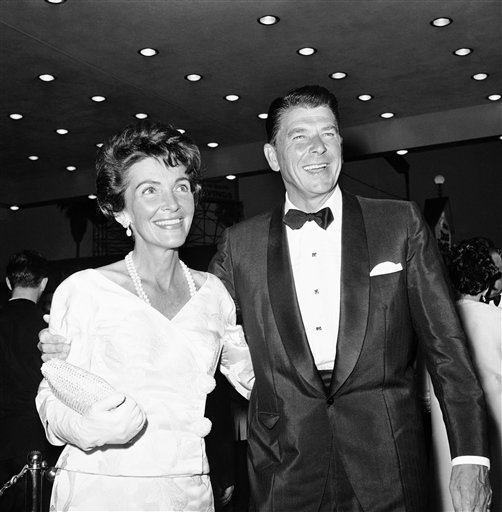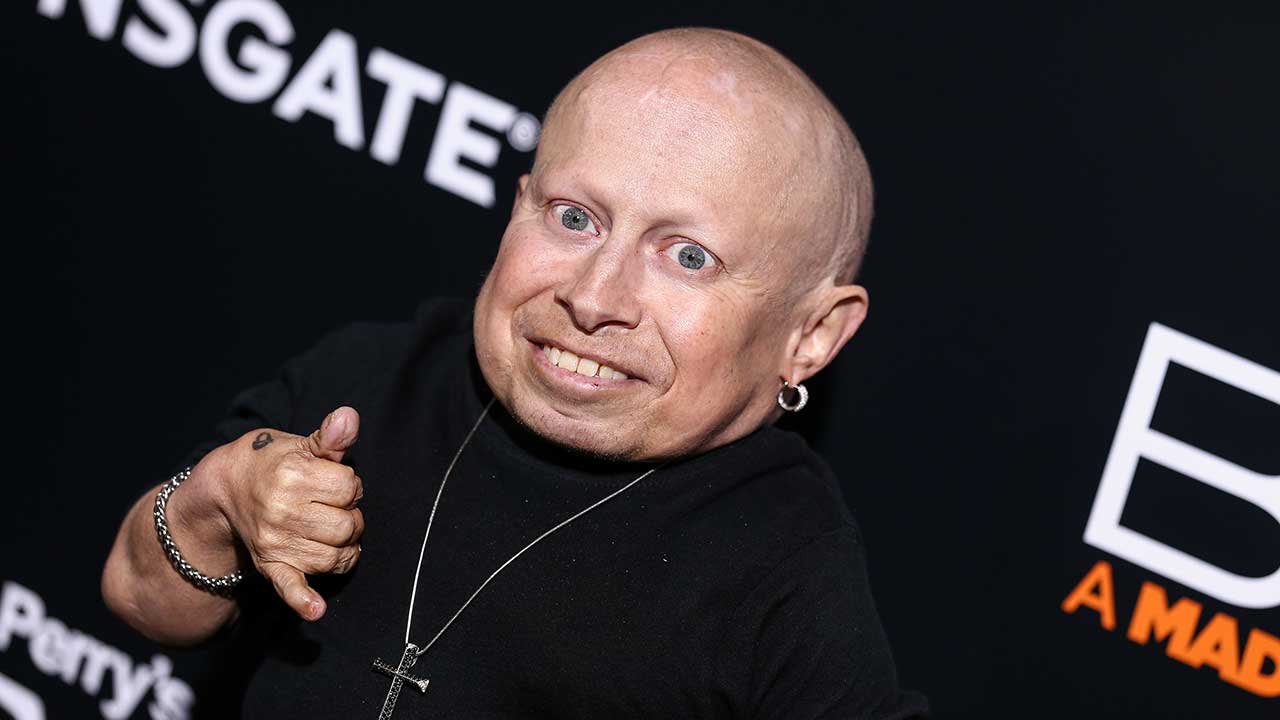Nancy Reagan, former first lady, dies at 94

LOS ANGELES (WLS) -- Nancy Reagan, wife of former President Ronald Reagan, has died at age 94.
Nancy Davis Reagan died of congestive heart failure at her home in Los Angeles Sunday morning, The Ronald Reagan Foundation said in a statement.
The former first lady will be buried next to her husband at the Ronald Reagan Presidential Library in Simi Valley, California, the foundation said. The former president died on June 5, 2004.
The public will have an opportunity to pay their respects at the library before the funeral service begins. The foundation said details will be released soon.
"In lieu of flowers, we hope you will remember Mrs. Reagan with a memorial gift to the Ronald Reagan Presidential Foundation. The Reagan Foundation was created by President and Mrs. Reagan to preserve the Reagan Legacy and continue President Reagan's work for the benefit of future generations," the foundation's website said Sunday.
Anne Frances Robbins, nicknamed Nancy, was born in New York City on July 6, 1921, but she was raised in Chicago. She graduated from Latin School of Chicago in 1939.
Many politicians and celebrities took to social media to convey their sadness at Nancy Reagan's passing. READ THEM ALL HERE.
President Barack Obama and First Lady Michelle Obama issued this statement Sunday:
"Nancy Reagan once wrote that nothing could prepare you for living in the White House. She was right, of course. But we had a head start, because we were fortunate to benefit from her proud example, and her warm and generous advice. Our former First Lady redefined the role in her time here. Later, in her long goodbye with President Reagan, she became a voice on behalf of millions of families going through the depleting, aching reality of Alzheimer's, and took on a new role, as advocate, on behalf of treatments that hold the potential and the promise to improve and save lives. We offer our sincere condolences to their children, Patti, Ron, and Michael, and to their grandchildren. And we remain grateful for Nancy Reagan's life, thankful for her guidance, and prayerful that she and her beloved husband are together again."
"As our nation's First Lady, Nancy Reagan will be remembered for her unwavering support of our country and as a pillar of strength to one of our nation's greatest presidents. As an advocate for anti-drug programs, she helped educate a generation, and she was a champion for Alzheimer's research to find more treatments and a cure for the disease. Throughout her entire life, Nancy Reagan worked diligently to improve the lives of so many Americans. Diana and I are saddened to hear about her death, and extend our deepest sympathies to her children and the rest of her family," Illinois Governor Bruce Rauner said in a statement Sunday.
"With grace and charm, Nancy Reagan represented the best of America and captured the spirit of this great country. She will go down in history as a woman who, alongside her loving husband, helped steer our nation through many difficult days. She will forever be missed. My thoughts and prayers go out to the Reagan family and all those who loved Mrs. Reagan so much," Illinois Republican Party Chairman Tim Schneider said in a statement Sunday.
IN MEMORIAM: Celebrities and notable figures who have recently passed away
Nancy Reagan was the helpmate, backstage adviser and fierce protector of Ronald Reagan in his journey from actor to president - and finally during his 10-year battle with Alzheimer's disease.
Her best-known project as first lady was the "Just Say No" campaign to help kids and teens stay off drugs.
When she swept into the White House in 1981, the former Hollywood actress partial to designer gowns and pricey china was widely dismissed as a pre-feminist throwback, concerned only with fashion, decorating and entertaining. By the time she moved out eight years later, Mrs. Reagan was fending off accusations that she was a behind-the-scenes "dragon lady" wielding unchecked power over the Reagan administration - and doing it based on astrology to boot.
All along she maintained that her only mission was to back her "Ronnie" and strengthen his presidency.
Mrs. Reagan carried that charge through the rest of her days. She served as a full-time caretaker as Alzheimer's melted away her husband's memory. After his death in June 2004 she dedicated herself to tending his legacy, especially at his presidential library in California, where he had served as governor.
She also championed Alzheimer's patients, raising millions of dollars for research and breaking with fellow conservative Republicans to advocate for stem cell studies. Her dignity and perseverance in these post-White House roles helped smooth over the public's fickle perceptions of the former first lady.
The Reagans' mutual devotion over 52 years of marriage was legendary. They were forever holding hands. She watched his political speeches with a look of such steady adoration it was dubbed "the gaze." He called her "Mommy," and penned a lifetime of gushing love notes. She saved these letters, published them as a book, and found them a comfort when he could no longer remember her.
In announcing his Alzheimer's diagnosis in 1994, Reagan wrote, "I only wish there was some way I could spare Nancy from this painful experience." Ten years later, as his body lay in state in the U.S. Capitol, Mrs. Reagan caressed and gently kissed the flag-draped casket.
As the newly arrived first lady, Mrs. Reagan raised more than $800,000 from private donors to redo the White House family quarters and to buy a $200,000 set of china bordered in red, her signature color. She was criticized for financing these pet projects with donations from millionaires who might seek influence with the government, and for accepting gifts and loans of dresses worth thousands of dollars from top designers. Her lavish lifestyle - in the midst of a recession and with her husband's administration cutting spending on the needy - inspired the mocking moniker "Queen Nancy."
But her admirers credited Mrs. Reagan with restoring grace and elegance to the White House after the austerity of the Carter years.
Her substantial influence within the White House came to light slowly in her husband's second term.
Although a feud between the first lady and chief of staff Donald Regan had spilled into the open, the president dismissed reports that it was his wife who got Regan fired. "The idea that she is involved in governmental decisions and so forth and all of this, and being a kind of dragon lady - there is nothing to that," a visibly angry Reagan assured reporters.
But Mrs. Reagan herself and other insiders later confirmed her role in rounding up support for Regan's ouster and persuading the president that it had to be done, because of the Iran-Contra scandal that broke under Regan's watch.
She delved into policy issues, too. She urged Reagan to finally break his long silence on the AIDS crisis. She nudged him to publicly accept responsibility for the arms-for-hostages scandal. And she worked to buttress those advisers urging him to thaw U.S. relations with the Soviet Union, over the objections of the administration's "evil empire" hawks.
Near the end of Reagan's presidency, ex-chief of staff Regan took his revenge with a memoir revealing that the first lady routinely consulted a San Francisco astrologer to guide the president's schedule. Mrs. Reagan, who had a longtime interest in horoscopes, maintained that she used the astrologer's forecasts only in hopes of predicting the safest times for her husband to venture out of the White House after an assassination attempt by John Hinckley just three months into Reagan's presidency.
Mrs. Reagan's parents separated soon after she was born and her mother, film and stage actress Edith Luckett, went on the road. Nancy was reared by an aunt until 1929, when her mother married Dr. Loyal Davis, a wealthy Chicago neurosurgeon who gave Nancy his name and a socialite's home. She majored in drama at Smith College and found stage work with the help of her mother's connections.
In 1949, MGM signed 5-foot-4, doe-eyed brunette Nancy Davis to a movie contract. She was cast mostly as a loyal housewife and mother. She had a key role in "The Next Voice You Hear ...," an unusual drama about a family that hears God's voice on the radio. In "Donovan's Brain," she played the wife of a scientist possessed by disembodied gray matter.
She met Ronald Reagan in 1950, when he was president of the Screen Actors Guild and she was seeking help with a problem: Her name had been wrongly included on a published list of suspected communist sympathizers. They discussed it over dinner, and she later wrote that she realized on that first blind date "he was everything that I wanted."
They wed two years later, on March 4, 1952. Daughter Patti was born in October of that year and son Ron followed in 1958. Reagan already had a daughter, Maureen, and an adopted son, Michael, from his marriage to actress Jane Wyman. (Later, public spats and breaches with her grown children would become a frequent source of embarrassment for Mrs. Reagan.)
She was thrust into the political life when her husband ran for California governor in 1966 and won. She found it a surprisingly rough business.
"The movies were custard compared to politics," Mrs. Reagan said.
The Associated Press contributed to this report.







































































































































































